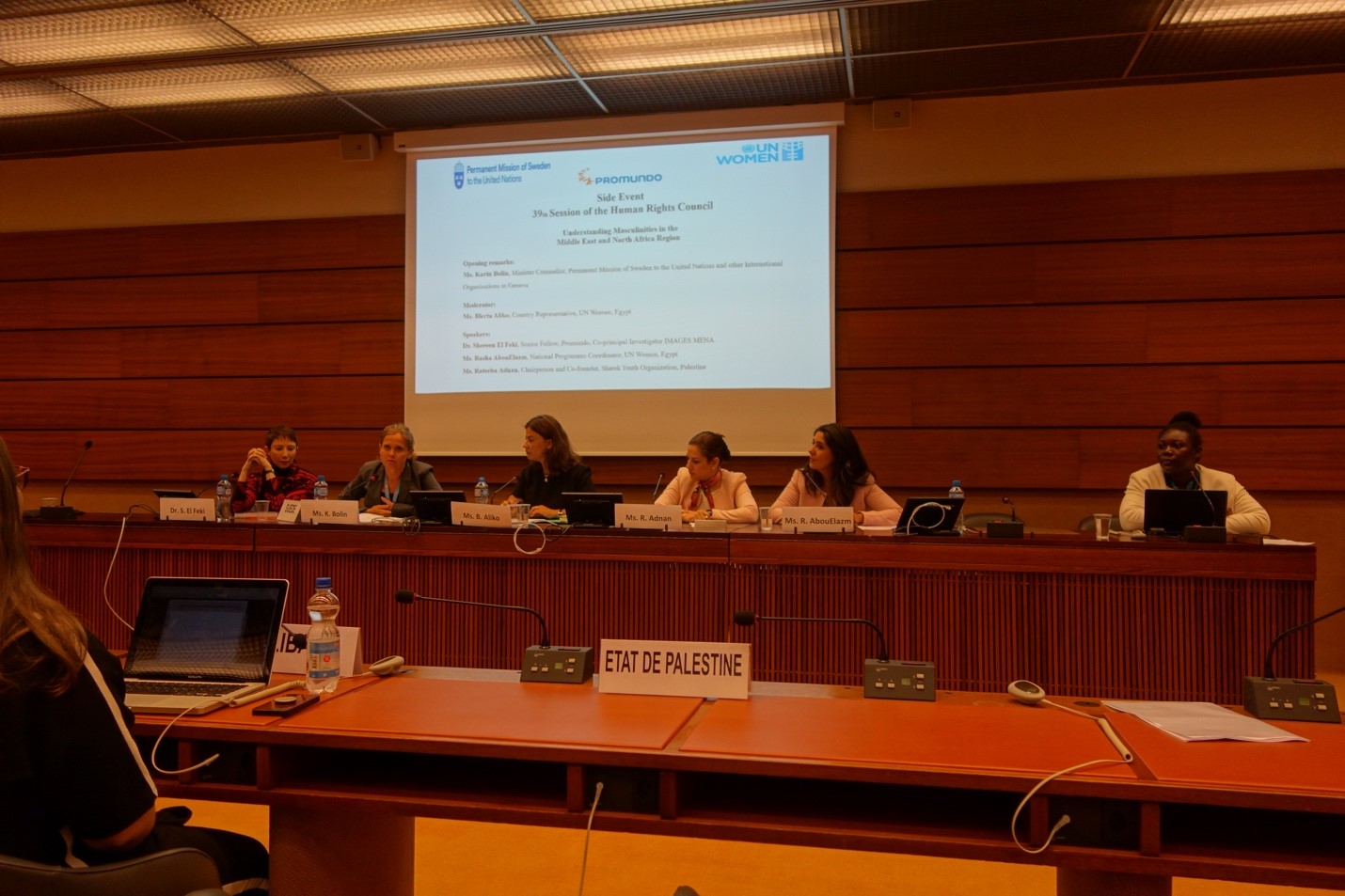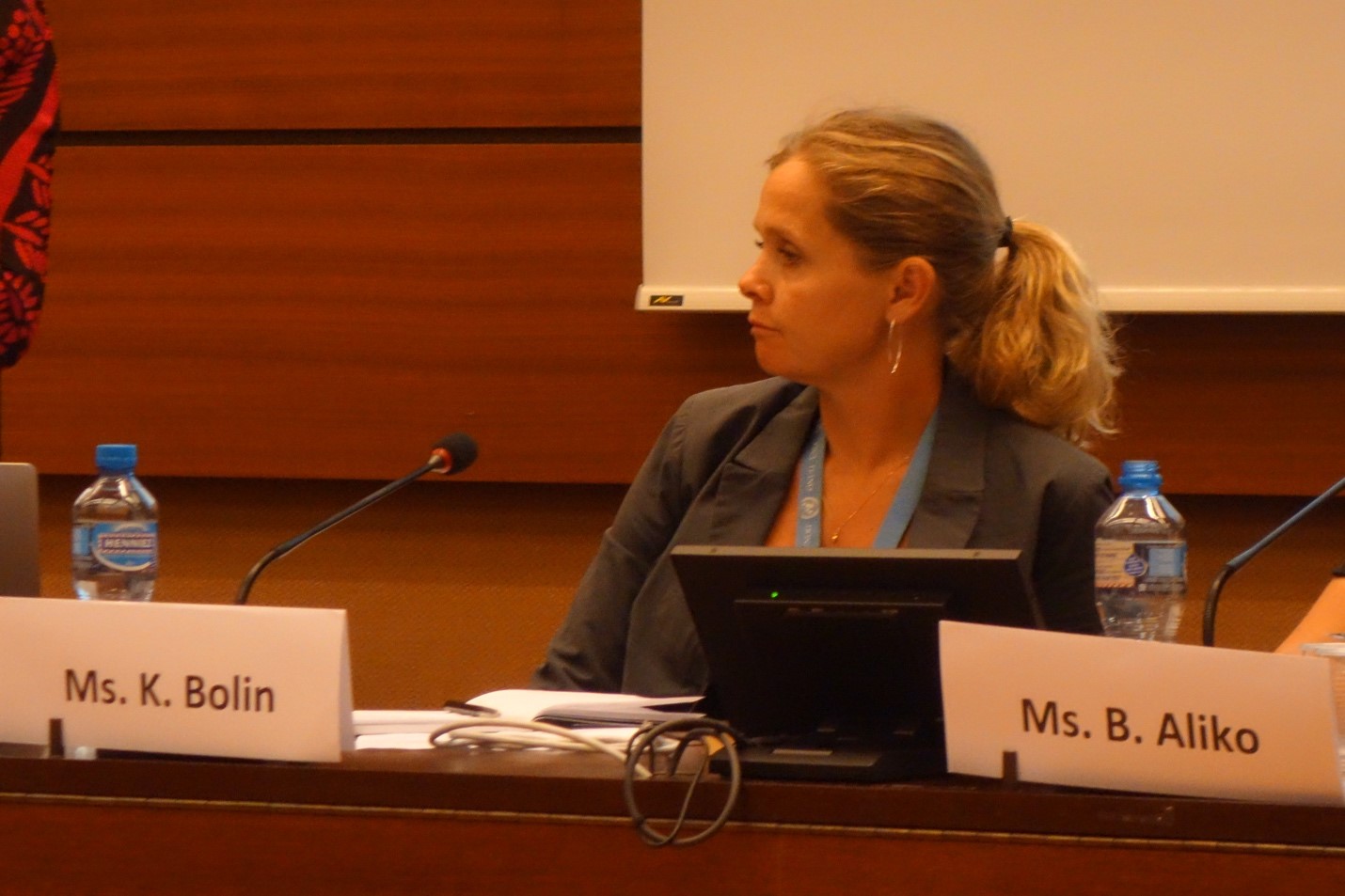United Nations Human Rights Council event discusses masculinities in the MENA Region
Date:

UN Women Regional Office for the Arab States, in partnership with the Permanent Mission of Sweden to the United Nations in Geneva and Promundo, convened a side event on masculinities in the Middle East and North Africa (MENA) region during the 39th session of the United Nations Human Rights Council.
The event explored perceptions and realities of masculinities in the region, as documented through the findings of the International Men and Gender Equality Survey (IMAGES) MENA, conducted by Promundo and UN Women with local research partners under the regional UN Women Men and Women for Gender Equality Programme, funded by the Swedish International Development Cooperation Agency (Sida).
Dr. Shereen El Feki, co-principal researcher on IMAGES MENA, presented the study, which was conducted in Egypt, Lebanon, Morocco and Palestine, during 2016 and 2017. The research findings revealed that men and women in the region are under enormous pressure, as around a quarter of the men and half the women surveyed reported experiencing depressive symptoms.

Ms. Karin Bolin, Minister-Counsellor at the Permanent Mission of Sweden to the United Nations in Geneva, emphasized Sweden’s long-standing commitment to gender equality and noted that “a gender equal society benefits all – women, men, boys and girls. The IMAGES MENA is a pioneer study and in line with Sweden’s feminist policy.”
Blerta Aliko, UN Women’s Representative in Egypt, highlighted some of the recent progress made towards gender equality in the MENA region. Tunisia has passed the single most comprehensive bill on violence against women in the region, while both Jordan and Lebanon have repealed laws that granted immunity to a rapist if he married his victim. In 2016, Egypt adopted the National Strategy for the Empowerment of Egyptian Women 2030, a comprehensive document on women’s empowerment and gender equality in line with the Sustainable Development Goals (SDGs). Egypt has furthermore criminalized female genital mutilation (FGM). Palestine has opened the first ‘one stop shop’ for survivors of violence in the region, providing a comprehensive list of cross-sectoral services.
Ms. Rasha AbouElazm, National Programme Coordinator at UN Women Egypt Country Office, demonstrated how UN Women is working with its national partners in the four countries of the survey to develop and implement programmes informed by the survey findings. In the case of Egypt, Ms. AbouElazm said “UN Women decided to build on male and female positive role models, with a strong focus on the participation of youth. The IMAGES recommendations informed our community mobilization actions, our social media campaigns, work with regional youth networks, and fatherhood photography and art exhibitions. UN Women also worked with its civil society partners to support capacity-building and inform policy dialogues and advocacy.”
Also drawing on the findings of IMAGES MENA, UN Women launched the ‘Because I Am a Man’ campaign in 2017, where men from the four participating countries speak up to support gender equality and defy gender stereotypes. The celebrated Egyptian international footballer Mohammad Salah was one of the first supporters of the campaign, which in the first two weeks reached over 7 million views on social media.
Ms. Rateeba Adnan Abu Ghosh, chair and co-founder of Sharek Youth Forum in Palestine, spoke about how she has applied the research findings, and further training on masculinities and engaging men and boys in gender equality within her personal life, her organization, and in the community. She said “I must be the change that I want to see. I challenged my attitudes and started with my own family”.
During the Q&A session H.E. Mr Alaa Youssef, Ambassador and Permanent Representative of Egypt to the United Nations at Geneva expressed his full support for gender equality and said “women are the main catalysts for positive change. I fully support the ‘Because I am a man’ campaign. We need it, as we need to engage positively with youth for gender equality.”